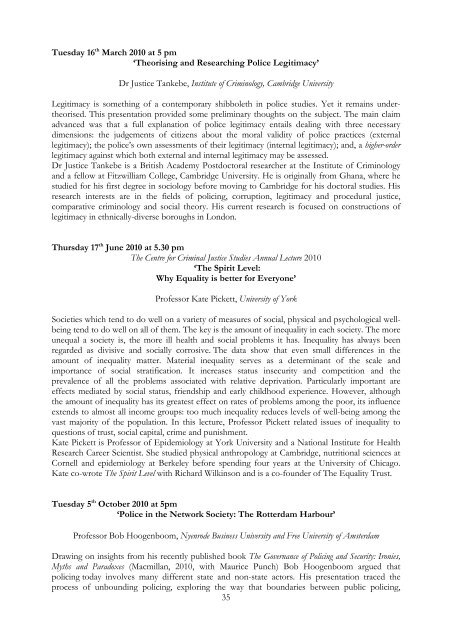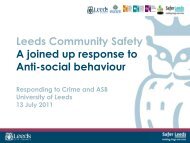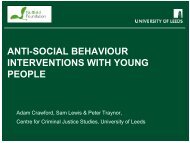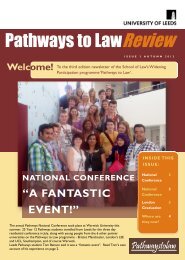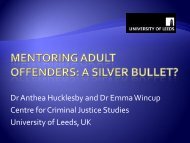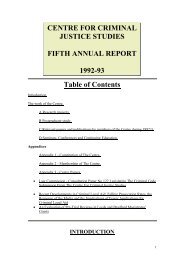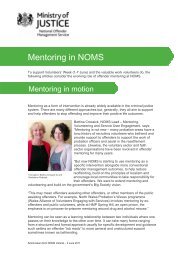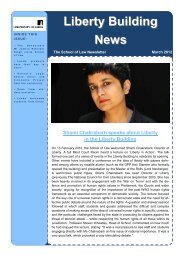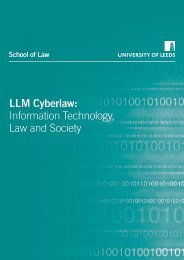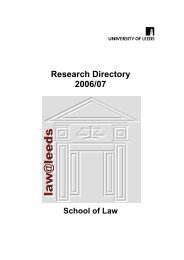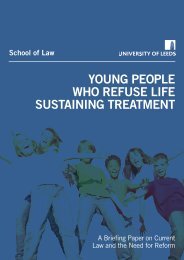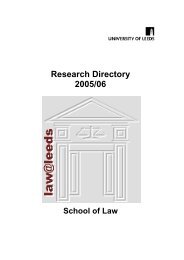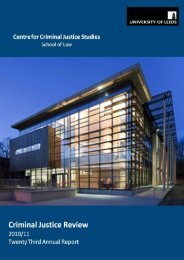Perceptions of Security and Reassurance at the ... - School of Law
Perceptions of Security and Reassurance at the ... - School of Law
Perceptions of Security and Reassurance at the ... - School of Law
Create successful ePaper yourself
Turn your PDF publications into a flip-book with our unique Google optimized e-Paper software.
Tuesday 16 th March 2010 <strong>at</strong> 5 pm‘Theorising <strong>and</strong> Researching Police Legitimacy’Dr Justice Tankebe, Institute <strong>of</strong> Criminology, Cambridge UniversityLegitimacy is something <strong>of</strong> a contemporary shibboleth in police studies. Yet it remains under<strong>the</strong>orised.This present<strong>at</strong>ion provided some preliminary thoughts on <strong>the</strong> subject. The main claimadvanced was th<strong>at</strong> a full explan<strong>at</strong>ion <strong>of</strong> police legitimacy entails dealing with three necessarydimensions: <strong>the</strong> judgements <strong>of</strong> citizens about <strong>the</strong> moral validity <strong>of</strong> police practices (externallegitimacy); <strong>the</strong> police’s own assessments <strong>of</strong> <strong>the</strong>ir legitimacy (internal legitimacy); <strong>and</strong>, a higher-orderlegitimacy against which both external <strong>and</strong> internal legitimacy may be assessed.Dr Justice Tankebe is a British Academy Postdoctoral researcher <strong>at</strong> <strong>the</strong> Institute <strong>of</strong> Criminology<strong>and</strong> a fellow <strong>at</strong> Fitzwilliam College, Cambridge University. He is originally from Ghana, where hestudied for his first degree in sociology before moving to Cambridge for his doctoral studies. Hisresearch interests are in <strong>the</strong> fields <strong>of</strong> policing, corruption, legitimacy <strong>and</strong> procedural justice,compar<strong>at</strong>ive criminology <strong>and</strong> social <strong>the</strong>ory. His current research is focused on constructions <strong>of</strong>legitimacy in ethnically-diverse boroughs in London.Thursday 17 th June 2010 <strong>at</strong> 5.30 pmThe Centre for Criminal Justice Studies Annual Lecture 2010‘The Spirit Level:Why Equality is better for Everyone’Pr<strong>of</strong>essor K<strong>at</strong>e Pickett, University <strong>of</strong> YorkSocieties which tend to do well on a variety <strong>of</strong> measures <strong>of</strong> social, physical <strong>and</strong> psychological wellbeingtend to do well on all <strong>of</strong> <strong>the</strong>m. The key is <strong>the</strong> amount <strong>of</strong> inequality in each society. The moreunequal a society is, <strong>the</strong> more ill health <strong>and</strong> social problems it has. Inequality has always beenregarded as divisive <strong>and</strong> socially corrosive. The d<strong>at</strong>a show th<strong>at</strong> even small differences in <strong>the</strong>amount <strong>of</strong> inequality m<strong>at</strong>ter. M<strong>at</strong>erial inequality serves as a determinant <strong>of</strong> <strong>the</strong> scale <strong>and</strong>importance <strong>of</strong> social str<strong>at</strong>ific<strong>at</strong>ion. It increases st<strong>at</strong>us insecurity <strong>and</strong> competition <strong>and</strong> <strong>the</strong>prevalence <strong>of</strong> all <strong>the</strong> problems associ<strong>at</strong>ed with rel<strong>at</strong>ive depriv<strong>at</strong>ion. Particularly important areeffects medi<strong>at</strong>ed by social st<strong>at</strong>us, friendship <strong>and</strong> early childhood experience. However, although<strong>the</strong> amount <strong>of</strong> inequality has its gre<strong>at</strong>est effect on r<strong>at</strong>es <strong>of</strong> problems among <strong>the</strong> poor, its influenceextends to almost all income groups: too much inequality reduces levels <strong>of</strong> well-being among <strong>the</strong>vast majority <strong>of</strong> <strong>the</strong> popul<strong>at</strong>ion. In this lecture, Pr<strong>of</strong>essor Pickett rel<strong>at</strong>ed issues <strong>of</strong> inequality toquestions <strong>of</strong> trust, social capital, crime <strong>and</strong> punishment.K<strong>at</strong>e Pickett is Pr<strong>of</strong>essor <strong>of</strong> Epidemiology <strong>at</strong> York University <strong>and</strong> a N<strong>at</strong>ional Institute for HealthResearch Career Scientist. She studied physical anthropology <strong>at</strong> Cambridge, nutritional sciences <strong>at</strong>Cornell <strong>and</strong> epidemiology <strong>at</strong> Berkeley before spending four years <strong>at</strong> <strong>the</strong> University <strong>of</strong> Chicago.K<strong>at</strong>e co-wrote The Spirit Level with Richard Wilkinson <strong>and</strong> is a co-founder <strong>of</strong> The Equality Trust.Tuesday 5 th October 2010 <strong>at</strong> 5pm‘Police in <strong>the</strong> Network Society: The Rotterdam Harbour’Pr<strong>of</strong>essor Bob Hoogenboom, Nyenrode Business University <strong>and</strong> Free University <strong>of</strong> AmsterdamDrawing on insights from his recently published book The Governance <strong>of</strong> Policing <strong>and</strong> <strong>Security</strong>: Ironies,Myths <strong>and</strong> Paradoxes (Macmillan, 2010, with Maurice Punch) Bob Hoogenboom argued th<strong>at</strong>policing today involves many different st<strong>at</strong>e <strong>and</strong> non-st<strong>at</strong>e actors. His present<strong>at</strong>ion traced <strong>the</strong>process <strong>of</strong> unbounding policing, exploring <strong>the</strong> way th<strong>at</strong> boundaries between public policing,35


